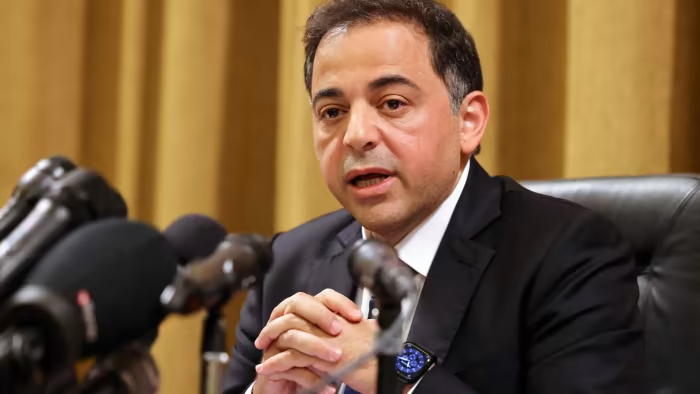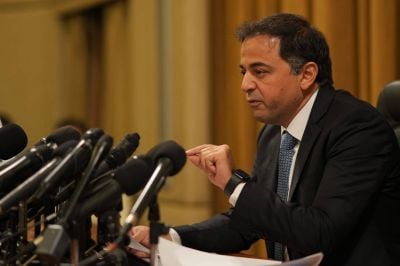
Banque du Liban's acting governor Wassim Mansouri during a press conference on July 31, 2023. (Credit: Joseph Eid/AFP)
BEIRUT — Acting Banque du Liban governor Wissam Mansouri has said he "will not lend the Lebanese state the people’s money."
Mansouri made the remarks in an interview with the Asharq al-Awsat newspaper published on Saturday. His comments come as the state continues to grapple with an unprecedented economic crisis in which it has been mired since 2019.
Mansouri's predecessor, Riad Salameh, is held responsible by some politicians and a segment of the population for creating the financial crisis. Salameh is also currently being prosecuted in Lebanon and several European countries for alleged corruption; however, he has consistently denied all charges against him.
In the Asharq al-Awsat interview, Mansouri said that if reform laws are not passed, he will not lend the state funds.
"Even if a law is passed in the Parliament for borrowing [money], and there are no reform laws accompanying it, I will not disburse the funds. This is my right under the law. There is no law that obliges me to make payments. There is a law that allows me to use people's money to lend to the state, but I will not do that, for a simple reason: if it [the loan] is not associated with reforms, we would have thrown this money to waste.”
'Lack of respect'
Regarding the funds of depositors illegally held in banks since the crisis erupted, Mansouri said, "People cannot be treated the way they are being treated now. This is a lack of respect for them and for the state."
"As for depositors' funds, there is a need for transparency and to work to find serious solutions, and this can only be done through the laws I demand [to be passed] — the reform laws, including capital control, bank restructuring, and the financial balance law. These three laws, along with a budget that reduces the deficit to the maximum extent, if completed, can achieve balance,” Mansouri said.
'We need help'
Mansouri also stated that "the cash economy in Lebanon should not and cannot continue."
"This cash economy will destroy the country. We need help, but if we don't help ourselves, who will help us?" he said.
Mansouri took the helm at the central bank on Aug. 1, after Salameh's 30-year tenure came to an end with his legacy in tatters over corruption allegations and the country's financial sector in turmoil.
Since Lebanon's economy began to unravel in 2019, the national currency's value has severely depreciated against the US dollar on the parallel market, depositors have been locked out of their bank savings and families have been pushed into poverty.
But the country has failed to enact reforms demanded by the International Monetary Fund to gain access to $3 billion in aid.
On Aug. 25, during a press conference, the acting BDL governor said that Lebanon's central bank would not print money to lend the state or cover the crisis-hit economy's projected deficit. He said that further delaying reforms "risks isolating the country from the global financial system."
A financial crime watchdog this year warned Lebanon could be placed on a gray list under special scrutiny over unsatisfactory practices to prevent money laundering and terrorism financing unless it enacted reforms.


